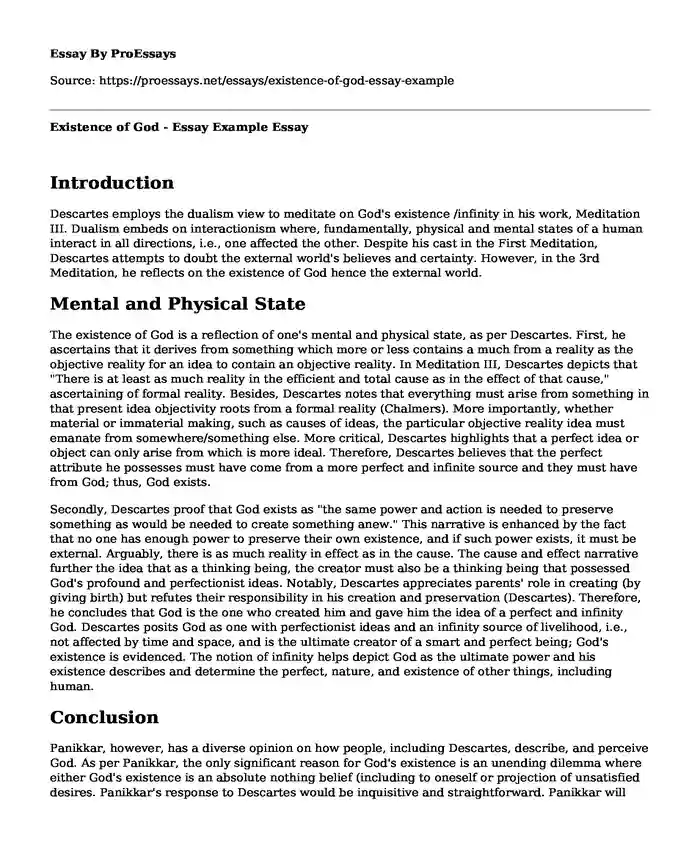Introduction
Descartes employs the dualism view to meditate on God's existence /infinity in his work, Meditation III. Dualism embeds on interactionism where, fundamentally, physical and mental states of a human interact in all directions, i.e., one affected the other. Despite his cast in the First Meditation, Descartes attempts to doubt the external world's believes and certainty. However, in the 3rd Meditation, he reflects on the existence of God hence the external world.
Mental and Physical State
The existence of God is a reflection of one's mental and physical state, as per Descartes. First, he ascertains that it derives from something which more or less contains a much from a reality as the objective reality for an idea to contain an objective reality. In Meditation III, Descartes depicts that "There is at least as much reality in the efficient and total cause as in the effect of that cause," ascertaining of formal reality. Besides, Descartes notes that everything must arise from something in that present idea objectivity roots from a formal reality (Chalmers). More importantly, whether material or immaterial making, such as causes of ideas, the particular objective reality idea must emanate from somewhere/something else. More critical, Descartes highlights that a perfect idea or object can only arise from which is more ideal. Therefore, Descartes believes that the perfect attribute he possesses must have come from a more perfect and infinite source and they must have from God; thus, God exists.
Secondly, Descartes proof that God exists as "the same power and action is needed to preserve something as would be needed to create something anew." This narrative is enhanced by the fact that no one has enough power to preserve their own existence, and if such power exists, it must be external. Arguably, there is as much reality in effect as in the cause. The cause and effect narrative further the idea that as a thinking being, the creator must also be a thinking being that possessed God's profound and perfectionist ideas. Notably, Descartes appreciates parents' role in creating (by giving birth) but refutes their responsibility in his creation and preservation (Descartes). Therefore, he concludes that God is the one who created him and gave him the idea of a perfect and infinity God. Descartes posits God as one with perfectionist ideas and an infinity source of livelihood, i.e., not affected by time and space, and is the ultimate creator of a smart and perfect being; God's existence is evidenced. The notion of infinity helps depict God as the ultimate power and his existence describes and determine the perfect, nature, and existence of other things, including human.
Conclusion
Panikkar, however, has a diverse opinion on how people, including Descartes, describe, and perceive God. As per Panikkar, the only significant reason for God's existence is an unending dilemma where either God's existence is an absolute nothing belief (including to oneself or projection of unsatisfied desires. Panikkar's response to Descartes would be inquisitive and straightforward. Panikkar will question Descartes's purity of heart that argument and listen to reality (emptiness) without expectations and pragmatic concerns. Besides, Descartes idolizes God by depicting him as a thing with superior of hidden power. Is this not taking the name of God in vain? "God is not a respecter of persons." Therefore as per Descartes's approach, he should not depict God as an elitist specialty but rather a discourse of our entire being (Panikkar). Therefore, Panikkar's response will be on how Descartes describes God (as a thing) and the differentiation of God from people in terms of power (as people still have power such as to kill) the existence of God should be more comprehensive and definite.
Work Cited
Chalmers, David J. "Philosophy of mind: Classical and contemporary readings." (2002).
Descartes, René. Meditations on first philosophy: With selections from the objections and replies. Oxford University Press, 2008.Panikkar, Raimon. "Nine ways not to talk about God." CrossCurrents (1997): 149-153. Retrieved 23 Nov, 2020 from
http://www.aril.org/panikkar.htm.
Cite this page
Existence of God - Essay Example. (2024, Jan 06). Retrieved from https://proessays.net/essays/existence-of-god-essay-example
If you are the original author of this essay and no longer wish to have it published on the ProEssays website, please click below to request its removal:
- Hume's Moral Philosophy - Essay Example
- Essay on History of Moral Philosophy
- William Penn's Quakerism and Religious Tolerance Beliefs Essay
- Ethics and Quantitative Business Research Paper Example
- Christ's Death & Resurrection: Foundational to Christian Faith - Essay Sample
- Essay Example on Tipping Etiquette: Customary or Non-Customary?
- Critical Thinking and Creative Problem-Solving: 8 Elements of Thought - Essay Sample







